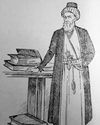يحاول ذهب - حر
The Philosopher & The Scientist
June/July 2017
|Philosophy Now
Tony Simpson tells us how the Russell-Einstein manifesto led to Pugwash.

“He was not only a great scientist but a greatman, a man whom it is good to have known and consoling to contemplate.” With these words Bertrand Russell concluded his Preface to Einstein on Peace (1960). Down the years, Russell and Albert Einstein had met from time to time, but they did not see much of each other except in 1943, when they were both living in Princeton. Then they would meet weekly at Einstein’s house to discuss “various matters in the philosophy of science.” Wolfgang Pauli and Kurt Gödel also attended. “I found these informal discussions very illuminating and exceedingly valuable,” said Russell.
Later, the US hydrogen bomb test at Bikini Atoll in the Pacific Ocean in March 1954 had spread radioactive fall-out across wide areas, contaminating Japanese fishermen and their catch aboard the Lucky Dragon fishing boat. Both the United States and the Soviet Union now had the hydrogen bomb. So in February 1955, Russell sent Einstein a proposal:
“In common with every other thinking person, I am profoundly disquieted by the armaments race in nuclear weapons. You have on various occasions given expression to feelings and opinions with which I am in close agreement. I think that eminent men of science ought to do something dramatic to bring home to the public and governments the disasters that may occur. Do you think it would be possible to get, say, six men of the very highest scientific repute headed by yourself, to make a very solemn statement about the imperative necessity of avoiding war?”
Notwithstanding his failing health, Einstein responded enthusiastically:
هذه القصة من طبعة June/July 2017 من Philosophy Now.
اشترك في Magzter GOLD للوصول إلى آلاف القصص المتميزة المنسقة، وأكثر من 9000 مجلة وصحيفة.
هل أنت مشترك بالفعل؟ تسجيل الدخول
المزيد من القصص من Philosophy Now

Philosophy Now
Bilbo Theorizes About Wellbeing
Eric Comerford overhears Bilbo and Gandalf discussing happiness.
9 mins
December 2025 / January 2026

Philosophy Now
What Women?
Marcia Yudkin remembers almost choking at Cornell
11 mins
December 2025 / January 2026

Philosophy Now
Islamic Philosophers On Tyranny
Amir Ali Maleki looks at tyranny from an Islamic perspective.
4 mins
December 2025 / January 2026

Philosophy Now
Peter Singer
The controversial Australian philosopher defends the right to choose to die on utilitarian grounds
5 mins
December 2025 / January 2026

Philosophy Now
Another Conversation with Martin Heidegger?
Raymond Tallis talks about communication problems.
7 mins
December 2025 / January 2026

Philosophy Now
Letters
When inspiration strikes, don't bottle it up. Email me at rick.lewis@philosophynow.org Keep them short and keep them coming!
17 mins
December 2025 / January 2026

Philosophy Now
The Philosophy of William Blake
Mark Vernon looks at the imaginative thinking of an imaginative artist.
9 mins
December 2025 / January 2026

Philosophy Now
Philosophical Haiku
Peering through life’s lens God in nature is deduced: The joy of being.
1 mins
December 2025 / January 2026

Philosophy Now
Philosophy Shorts
More songs about Buildings and Food' was the title of a 1978 album by the rock band Talking Heads. It was about all the things rock stars normally don't sing about. Pop songs are usually about variations on the theme of love; tracks like Rose Royce's 1976 hit 'Car Wash' are the exception. Philosophers, likewise, tend to have a narrow focus on epistemology, metaphysics and trifles like the meaning of life. But occasionally great minds stray from their turf and write about other matters, for example buildings (Martin Heidegger), food (Hobbes), tomato juice (Robert Nozick), and the weather (Lucretius and Aristotle). This series of Shorts is about these unfamiliar themes; about the things philosophers also write about.
2 mins
December 2025 / January 2026

Philosophy Now
Hedonic Treadmills in the Vale of Tears
Michael Gracey looks at how philosophers have pursued happiness.
8 mins
December 2025 / January 2026
Translate
Change font size
